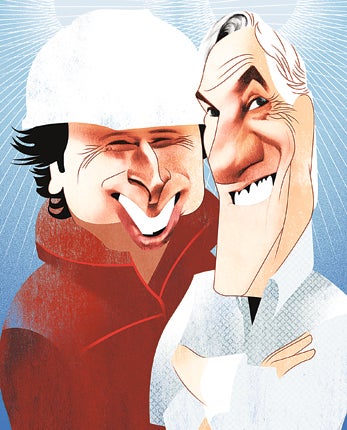Chile's leader lays the ghost of Pinochet
Hero or Villain? Sebastian Piñera

President Sebastian Piñera, an outgoing 61-year-billionaire, has cut a splendid figure to his countrymen and millions of others round the world at the Mina San José: Chile had pulled off the greatest rescue since Noah's ark. Now Chile's leader is trying to mend the damage to the country done by General Augusto Pinochet and his foul dictatorship after his Western-supported coup in 1973. "Unity! The future!" is Piñera's cry. All will wish him well.
But Don Sebastian can be as tricky as a wagon load of monkeys. As he condemns the low safety standards at San José, many Chileans recall no objection by him to the dictator allowing the mine owners to ignore their duty to provide escape routes from blocked mines.
The son of a senior civil servant turned ambassador, Piñera had a privileged education and brought back from Harvard the economic ideas current in the US in the 1970s. Piñera was able to feed into Pinochet's circle the latest orthodoxy from Washington with its aim of reducing legal constraints on business. An elder brother, José Piñera, was one of the dictator's ministers helping the suppression of political parties and trade unions and the privatisations of state assets, which made the Pinochet family immensely wealthy.
The President has certainly made a brave attempt to bury memories of his Pinochet days and presenting himself recently as anti-Pinochet. Yet his impassioned defence of the dictator after he was detained in London in 1998 is on the record. The arrest, said Piñera. was "an insult and an attack on the deepest elements of our sovereignty and our dignity".
His ascent to national prominence came through finance – building houses, massively promoting credit cards, buying a provincial bank, publishing, becoming Apple's representative in Chile. He sailed close to the wind in business and was fined in 2007 for insider trading, a penalty that he paid without appeal. He did the same in politics in 1992 when he had to abandon a shot at the presidency after his plotting against a woman rival was revealed through an illegal phone tap.
If Piñera fell under a bus and there were presidential elections tomorrow, Chile's new leader would be Laurence Golborne, who played a blinder in the government's media campaign. Having spent weeks at the Mina San José sharing the hopes and fears of the entombed miners' families, the minister of mining has demonstrated that he can, as one Chilean commentator remarked, eat a mortadella sandwich with anyone without being thought of as a poseur. And that's a claim few can make in Piñera's toffee-nosed cabinet.
Golborne's first brush with commerce came when he worked weekends in his father's modest ironmongery. He went to a state school and studied very hard. He also went with his dad to the local meetings of the Partido Nacional, the most right-wing party that Chile at the time had.
His sister was a communist, and she died in Sweden in exile from Pinochet, whom Golborne tended to admire. Today he says he admires Winston Churchill and likes achieving results. "You get addicted to that adrenalin, to seeing things get done," he says.
Join our commenting forum
Join thought-provoking conversations, follow other Independent readers and see their replies
Comments
Bookmark popover
Removed from bookmarks